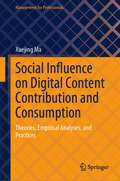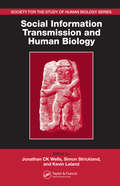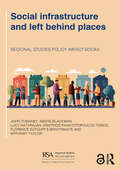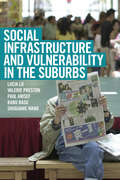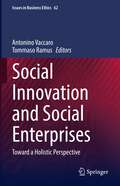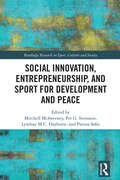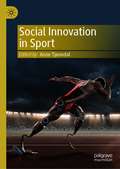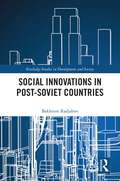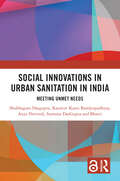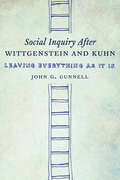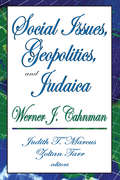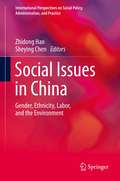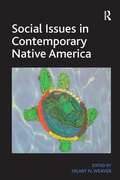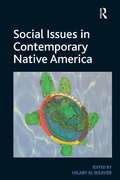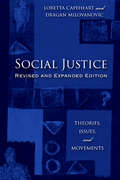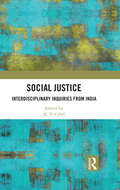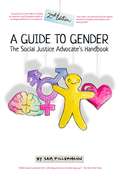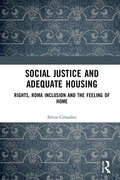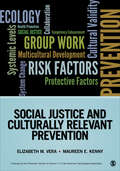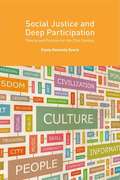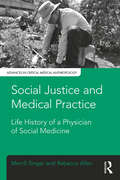- Table View
- List View
Social Influence on Digital Content Contribution and Consumption: Theories, Empirical Analyses, and Practices (Management for Professionals)
by Xuejing MaThis book examines users’ digital content contribution and consumption behavior from a social perspective. Digital content is everywhere—from search results on search engines to posts on social media. Incentivizing users to contribute abundant content and motivating users to engage in and pay for digital content are vital for online platforms, especially those relying on digital content generated by users. This book develops a theoretical framework to incorporate social influence, including social presence, social interaction, social comparison, social loafing, and social relationships, in users’ digital content contribution and consumption decisions. Further, using a large volume of data from online platforms, the author empirically studies the role of social interaction in digital content provision and monetization from the supply side. Also, regarding the digital content demand side, this book explores how to boost content consumption via social motives and social norms. The book enriches the understanding of social influence in digital content contribution and consumption and provides practical suggestions for digital platforms’ mechanism design.
Social Influences on Romantic Relationships
by Christopher R. AgnewHow do we choose a partner to initiate a relationship with, and what makes us stay in a given relationship over time? These questions are most often pursued by scholars with an emphasis on the internal thoughts, feelings, and motivations of individual decision-makers. Conversely, this volume highlights the importance of considering external influences on individual decision-making in close relationships. Featuring contributions from internationally renowned scholars, the volume is divided into two interrelated sections. The first section considers global and societal influences on romantic relationships and the second focuses on social network and communicative influences on romantic relationships. Taken together, this collection helps us to better understand how external factors influence the internal machinations of those involved in intimate relationships.
Social Information Transmission and Human Biology (Society for the Study of Human Biology)
by Jonathan Ck Wells Simon Strickland Kevin LalandRecent research has emphasized that socially transmitted information may affect both the gene pool and the phenotypes of individuals and populations, and that an improved understanding of evolutionary issues is beneficial to those working towards the improvement of human health. In response to a growing interest across disciplines for information regarding the contribution of social behavior to a range of biological outcomes, Social Information Transmission and Human Biology connects the work of evolutionary theorists and those dealing with practical issues in human health and demographics. Combining evolutionary models with biomedical research, authors from various disciplines look at how human behavior influences health, and how reproductive fitness sheds light on the processes that shaped the evolution of human behavior. Both academic and medical researchers will find much useful insight in this text.
Social infrastructure and left behind places (Regional Studies Policy Impact Books)
by John Tomaney Maeve Blackman Lucy Natarajan Dimitrios Panayotopoulos-Tsiros Florence Sutcliffe-Braithwaite Myfanwy TaylorThis book explores the making, unmaking and remaking of social infrastructure in ‘left-behind places’. Such places, typically once flourishing industrial communities that have been excluded from recent economic growth, now attract academic and policy attention as sites of a political backlash against globalisation and liberal democracy. The book focuses on the role of social infrastructure as a key component of this story. Seeking to move beyond a narrowly economistic of reading ‘left behind places’, the book addresses the understudied affective dimensions of ‘left-behindness’. It develops an analytical framework that emphasises the importance of place attachments and the consequences of their disruption; considers ‘left behind places’ as ‘moral communities’ and the making of social infrastructure as an expression of this; views the unmaking of social infrastructure through the lens of ‘root shock’; and explains efforts at remaking it in terms of the articulation of ‘radical hope’. The analysis builds upon a case study of a former mining community in County Durham, North East England. Using mixed methods, it offers a ‘deep place study’ of a single village to understand more fully the making, unmaking and remaking of social infrastructure. It shows how a place once richly endowed with social infrastructure, saw this endowment wither and the effects this had on the community. However, it also records efforts of the local people to rebuild social infrastructure, typically drawing the lessons of the past. Although the story of one village, the methods, results and policy recommendation have much wider applicability. The book will be of interest to researchers, policy makers and others concerned with the fate of ‘left behind places’.
Social infrastructure and left behind places (Regional Studies Policy Impact Books)
by John Tomaney Maeve Blackman Lucy Natarajan Dimitrios Panayotopoulos-Tsiros Florence Sutcliffe-Braithwaite Myfanwy TaylorThis book explores the making, unmaking and remaking of social infrastructure in ‘left-behind places’. Such places, typically once flourishing industrial communities that have been excluded from recent economic growth, now attract academic and policy attention as sites of a political backlash against globalisation and liberal democracy. The book focuses on the role of social infrastructure as a key component of this story.Seeking to move beyond a narrowly economistic of reading ‘left behind places’, the book addresses the understudied affective dimensions of ‘left-behindness’. It develops an analytical framework that emphasises the importance of place attachments and the consequences of their disruption; considers ‘left behind places’ as ‘moral communities’ and the making of social infrastructure as an expression of this; views the unmaking of social infrastructure through the lens of ‘root shock’; and explains efforts at remaking it in terms of the articulation of ‘radical hope’.The analysis builds upon a case study of a former mining community in County Durham, North East England. Using mixed methods, it offers a ‘deep place study’ of a single village to understand more fully the making, unmaking and remaking of social infrastructure. It shows how a place once richly endowed with social infrastructure, saw this endowment wither and the effects this had on the community. However, it also records efforts of the local people to rebuild social infrastructure, typically drawing the lessons of the past. Although the story of one village, the methods, results and policy recommendation have much wider applicability.The book will be of interest to researchers, policy makers and others concerned with the fate of ‘left behind places’.The Open Access version of this book, available at http://www.taylorfrancis.com, has been made available under a Creative Commons Attribution-Non Commercial (CC-BY-NC) 4.0 license.
Social Infrastructure and Vulnerability in the Suburbs
by Paul Anisef Valerie Preston Lucia Lo Shuguang Wang Ranu BasuSocial Infrastructure and Vulnerability in the Suburbs examines how the combination of the low-density, car-centric geography of outer suburbs and neoliberal governance in the past several decades has affected disadvantaged populations in North American metro areas. Taking the example of York Region, a large outer suburb north of Toronto, the authors provide a spatial analysis that illuminates the invisible geography of vulnerability in the region.The volume examines access to social services by vulnerable groups who are not usually associated with the suburbs: recent immigrants, seniors, and low-income families. Investigating their access to four types of social infrastructure - education, employment, housing, and settlement services - this book presents a range of policy recommendations for how to address the social inequalities that characterize contemporary outer suburbs.
Social Innovation and Social Enterprises: Toward a Holistic Perspective (Issues in Business Ethics #62)
by Antonino Vaccaro Tommaso RamusThis book provides an exhaustive, critical analysis of the challenges and opportunities associated with social enterprises and social innovation. More specifically, it addresses questions such as: What is a social innovation? Which are the best theories that explain how social innovations are generated and propagated in the global society? What is a social enterprise? Which are the theoretical perspectives that best describe the functioning of Social Enterprises , the threats and opportunities? How do social enterprises deal with the profit and non profit worlds and how these interactions affect their capability to be social innovators?The most recent literature has focused on strategies integrating conflicting logic, organizational practices or processes. In all these cases, the hybrid nature of the organization is implemented and sustained through original business models, new organizational arrangements and governance and novel strategies. We believe that the hybrid and institutional perspectives are just one of the many theoretical lenses that can be used to frame social innovation and social enterprises. Along this line, some have highlighted the inherent ethical nature of these phenomena, the critical role played by ethical values whose advancement go well beyond what expected by the corporate social responsibility, business ethics and institutional theorizing.This book follows these perspectives exploring the link between social innovation and social enterprises, presenting them as a new a new possible field of research that support new ways to understand and theorize individual, organizational and community behaviors.
Social Innovation, Entrepreneurship, and Sport for Development and Peace (Routledge Research in Sport, Culture and Society)
by Mitchell McSweeney Per G. Svensson Lyndsay M.C. Hayhurst Parissa SafaiThis book examines the ways in which sport for development and peace (SDP) offers an opportunity for entrepreneurship to take place through and within sport, and how innovation in the context of SDP contributes to social and economic value for underrepresented and marginalised groups and individuals. Written by a team of leading international SDP researchers, and featuring the voices of active SDP practitioners, the book examines the ways in which entrepreneurs seek to use sport and/or social innovation in and through sport to achieve their goals of social and economic development. It explores the strategies that SDP organizations and practitioners are utilizing in the current neoliberal moment to not only survive during economic hardship - particularly during the COVID 19 crisis - but also to thrive, drawing on important concepts such as innovation, risk taking, proactiveness and opportunity seeking. It also considers how nongovernmental organizations, companies, governments, and communities are working to tackle development issues in SDP using non-traditional forms of organization and management, such as social enterprise models. Combining cutting-edge research with reflections on best practice in the field, this book is important reading for any advanced student, researcher or practitioner with an interest in the sociology of sport, sport for development, sport management, development studies, social enterprise or innovation.
Social Innovation in Sport
by Anne TjønndalThis book provides fresh insights on how social innovations are utilized as strategies to make sport more accessible and inclusive. It does so by bringing together theoretical insights and empirical studies from Norway, Sweden, Denmark, the United States, Australia, Turkey and Belgium. Within the overarching topic of social innovation in sport, this book covers contemporary themes such as digitalization, urban planning, gender equality and innovation in sport policy and practice. It will be of interest to researchers and students in the fields of sociology of sport, sport management, sport science and sociology.
Social Innovations in Post-Soviet Countries (Routledge Studies in Development and Society)
by Bakhrom RadjabovThis book evaluates the evolution of social innovation in post-Soviet Central Asia, Eastern Europe and Caucasus. Following the dissolution of the USSR, organisations such as the UNDP have encouraged local communities and governments to innovate in order to find solutions to existing social problems. This book demonstrates that progress with social innovations has varied, with countries with low government support such as Uzbekistan struggling, whereas countries with better government support and a more active civil society, such as Armenia and Ukraine, have seen more positive results. Covering the period 2012-2020 and a broad range of countries, including Kazakhstan, Kyrgyzstan, Tajikistan and Uzbekistan, Moldova, Ukraine, Azerbaijan, Armenia, and Georgia, this book provides an impressively broad-ranging critical analysis of post-Soviet social innovation. Including social innovations emerging as a result of the Covid-19 outbreak, this will be an important comparative study for researchers and practitioners working on social innovation, and to those with an interest in post-Soviet development.
Social Innovations in Urban Sanitation in India: Meeting Unmet Needs
by Shubhagato Dasgupta Kaustuv Kanti Bandyopadhyay Anju Dwivedi Sumona Das Gupta Ms BhartiThis book discusses effective social innovation strategies facilitated by civil society organisations (CSOs) to tackle India’s significant urban sanitation challenge. It presents the contours of an ecosystem that includes citizen participation and strengthening community-managed systems for improved sanitation and public health. The book analyses case studies of effective sanitation programmes as well as experiments with innovative ideas in different regional contexts by CSOs to meet the contextual needs of the community and to ensure access to safe sanitation, especially among the urban poor. It highlights the challenges and the need for active participation of communities for change in behaviour, increasing institutional capacities of municipalities for standardising and scaling up strategies which work. The authors highlight the need for designing low-cost solutions, organising informal sanitation workers, serving marginalised communities and building effective alliances between communities and institutions to influence public policy. Rich in empirical data, this book will be useful for scholars and researchers of urban studies, public policy, governance, political science, development studies and sociology as well as for CSOs and non-governmental organisations (NGOs) working on urban sanitation, urban planning and public policy.
Social Inquiry After Wittgenstein and Kuhn: Leaving Everything as It Is
by John GunnellA distinctive feature of Ludwig Wittgenstein's work after 1930 was his turn to a conception of philosophy as a form of social inquiry, John G. Gunnell argues, and Thomas Kuhn's approach to the philosophy of science exemplified this conception. In this book, Gunnell shows how these philosophers address foundational issues in the social and human sciences, particularly the vision of social inquiry as an interpretive endeavor and the distinctive cognitive and practical relationship between social inquiry and its subject matter.Gunnell speaks directly to philosophers and practitioners of the social and human sciences. He tackles the demarcation between natural and social science; the nature of social phenomena; the concept and method of interpretation; the relationship between language and thought; the problem of knowledge of other minds; and the character of descriptive and normative judgments about practices that are the object of inquiry. Though Wittgenstein and Kuhn are often criticized as initiating a modern descent into relativism, this book shows that the true effect of their work was to undermine the basic assumptions of contemporary social and human science practice. It also problematized the authority of philosophy and other forms of social inquiry to specify the criteria for judging such matters as truth and justice. When Wittgenstein stated that "philosophy leaves everything as it is," he did not mean that philosophy would be left as it was or that philosophy would have no impact on what it studied, but rather that the activity of inquiry did not, simply by virtue of its performance, transform the object of inquiry.
Social Inquiry After Wittgenstein and Kuhn
by John G. GunnellA distinctive feature of Ludwig Wittgenstein's work after 1930 was his turn to a conception of philosophy as a form of social inquiry, John G. Gunnell argues, and Thomas Kuhn's approach to the philosophy of science exemplified this conception
Social Integration and Intermarriage in Europe: Islam, Partner-Choices and Parental Influence (Research In Migration And Ethnic Relations Ser.)
by Sarah CarolIntergroup friendships and marriages are regarded as the most important indicators of immigrants’ social integration, as they represent the most intimate ties that can exist between minority and majority group members. Drawing on unique, large-scale, cross-national survey data, encompassing natives as well as Turkish, Moroccan, Pakistani and ex-Yugoslav migrants across several Western European countries, this book offers extensive analyses of intermarriage, as well as attitudes towards intermarriage and intergroup dating in general. Conceptualising the willingness or otherwise to marry outside one’s ethnic or religious group in terms of social distance, Social Integration and Intermarriage in Europe provides new evidence that different conceptions of family life, gender relations and religiosity are crucial for understanding why individuals can be reluctant to engage in intergroup relationships. With attention to the question of the role played by state policies in explaining immigrant social integration, the book explores differences across Western Europe and the ways in which each state regulates immigration and the accommodation of Islam. A detailed and rigorous study of attitudes to intermarriage, social integration and the role of the state, Social Integration and Intermarriage in Europe will appeal to policy makers and scholars of within the social sciences, with interests in migration, interethnic relations and social integration.
Social Issues, Geopolitics, and Judaica
by Werner J. Cahnman Judith T. Marcus Zoltan TarrThis volume brings together thirty-four essays and ar- ticles by Werner J. Cahnman representing four decades (1940-1980) of work by an extraordinary, multidisciplinary scholar. Cahnman's work encompasses the experiences of a German Jewish refugee, an economist turned sociologist, and a scholar of Judaism. Part 1 contains personal and autobiographical writings and includes analyses of the cultural ambiguities of Jewish assimilation in Germany and Austria. Part 2 is devoted to sociological essays ranging from a critical assessment of Gunnar Myrdal's landmark study of the problems of race and democracy, An American Dilemma, to a probing look at the stigma of obesity, based on empirical research, a subject very much in the news today and that shows Cahnman ahead of his time. Part 3 offers some of Cahnman's most perceptive essays dealing with geopolitical themes. Included are theoretically based writings that help to clarify the methods and concepts of geopolitics, marking the intellectual beginnings of the global approach to world affairs. Here Cahnman broached the possibility of a united Europe (1944), realized sixty years later in the formation of the European Union. The twelve essays of Part 4 return to Cahnman's ever-present concern with Jews and Judaism. They present a wide-ranging historical-sociological view, from the Jews of Vienna in the 1930s to the American scene in the 1960s, to the still-unresolved problematics of Arab-Israeli relations, with Cahnman arguing for coexistence and a two-state solution for Jews and Arabs. The volume, carefully selected and assembled by the editors, presents for the first time essays representing the full range of Werner Cahnman's scholarship and thought. It will be of interest to students of sociology, history, political science, and Judaic studies.
Social Issues in China: Gender, Ethnicity, Labor, and the Environment
by Zhidong Hao Sheying ChenSince 1978, the opening up and reform in China has brought tremendous economic and social changes. While China's economic progress has been commendable, the social problems that go with economic changes have raised serious concerns. Some of those concerns are related to gender, ethnic, labor, and environmental issues. This book is about what has happened in these arenas in China since the opening up and reform in 1978. The study of gender, ethnicity, labor, and environment touches on some of the fundamental problems of modernization, especially the development of individuals and groups. So even though gender, ethnicity, labor, and environment seem to be separate issues, they are in fact related in some fundamental ways. That's what this book will explore as well. To understand is one thing and to do is another. This book also incorporates studies of NGO practices to see how NGOs have helped in transforming gender, ethnic, labor, and environment interplay. Our study of NGOs in helping improve such interplay sheds light on how specifically civil society can prod the state to transform social relations for the better. This book is an attempt to assess the changes, both positive and negative, in gender, ethnic, ethnic, and environmental relations in China especially in the past 30 years of opening up and reform, especially regarding national identity formation.
Social Issues in Contemporary Native America: Reflections from Turtle Island
by Hilary N. WeaverThe historical foundations of Native American social work in context in order to fully provide The reader with a comprehensive survey on various aspects of working with Native American families; community health and wellness; and community revitalization and decolonization.
Social Issues in Contemporary Native America: Reflections from Turtle Island
by Hilary N. WeaverHilary Weaver has drawn together leading Native American social workers, researchers, and academics to provide current information on a variety of social issues related to Native American children, families, and reservations both in the USA and in Canada. Divided into four major sections, each containing an introduction, this book places the historical foundations of Native American social work in context in order to fully provide the reader with a comprehensive survey on various aspects of working with Native American families; community health and wellness; and community revitalization and decolonization. This groundbreaking volume should be read by both educators and students in social work and other helping professions in the USA and Canada as well as all human service professionals working with Native Americans.
Social Justice: Theories, Issues, and Movements (Revised and Expanded Edition) (Critical Issues in Crime and Society)
by Loretta Capeheart Dragan MilovanovicAn eye for an eye, the balance of the scales – for centuries, these and other traditional concepts exemplified the public’s perception of justice. Today, popular culture, including television shows like Law and Order, informs the public’s vision. But do age-old symbols, portrayals in the media, and existing systems truly represent justice in all of its nuanced forms, or do we need to think beyond these notions? The second edition of Social Justice: Theories, Issues, and Movements responds to the need for a comprehensive introduction to these issues. Theories of social justice are presented in an accessible fashion to encourage engagement of students, activists, and scholars with these important lines of inquiry. Issues are analyzed utilizing various theories for furthering engagement in possibilities. Struggles for justice -- from legal cases to on the ground movements -- are presented for historical context and to inform the way forward.
Social Justice: Interdisciplinary Inquiries from India
by K. V. CybilThis book explores the political and philosophical underpinnings of exclusion and social injustice in India. It examines social movements, anti-caste uprisings, reformers like Ambedkar and Narayana Guru and writers like Foucault and Serres to establish a link between the political and social milieu of the idea of nationhood. Going beyond the legal framework of justice, the essays in the volume reassemble the social from popular perception and the margins, and challenge Rawlsian and Eurocentric paradigms which have dominated discourse on social injustice. The volume also draws on instances of history as well as contemporary issues, as well as locating them in the context of social and post-colonial theory. An intellectually stimulating yet subaltern engagement with the idea of justice, the volume will be of great interest to scholars and researchers of social theory, law, modern South Asian history and social exclusion and discrimination studies.
The Social Justice Advocate's Handbook: A Guide to Gender (Second Edition)
by Sam KillermannWhere do we start, when it comes to learning about something that's everywhere, infused into everything, and is often one of the primary lenses through which we see ourselves and others? When it comes to understanding gender, it's best to begin with deep breath, then with section one of this book by social justice advocate Sam Killermann, who uses clear language, helpful examples, and a bit of humor to help the medicine go down. This book is not overwhelming, it's not overly complicated, and it's not exhausting to read. It is a few hundred pages of gender exploration, social justice how-tos, practical resources, and fun graphics & comics. Sam dissects gender using a comprehensive, non-binary toolkit, with a focus on making this subject accessible and enjoyable. All this to help you understand something that is so commonly misunderstood, but something we all think we get: gender.
Social Justice and Adequate Housing: Rights, Roma Inclusion and the Feeling of Home
by Silvia CittadiniThis book presents a critical analysis of the concept of ‘adequate housing’. While the concept of adequate housing is used largely as a normative standard in the protection of housing rights and in the implementation of housing policies, its apparent objectivity and universality have never been questioned by political and legal theory. This book analyses and challenges the understanding of this term in law and politics by investigating its relationship with the idea of ‘home’. ‘It is necessary to provide them with adequate housing!’ It is very common to hear this phrase when dealing with housing poverty, especially in relation to migrants, minorities, indigenous and other subaltern groups are concerned. But what does "adequate housing" mean? This book tackles this issue by proposing a critical analysis of this concept and of its use in the development of housing policies addressing the subaltern group par excellence in Europe, Roma. In so doing, it focuses on the lives of Roma and Sinti in Italy who have been the target of inclusion policies. Highlighting the emotional connection to housing, and dismantling some of the most ‘common sense’ ideas about Roma, it offers a radical revision of how social justice in the housing sector might be refigured. This book will be invaluable for scholars and students working on relevant themes in socio and critical legal studies, sociology, human rights, urban studies, human geography and Romani studies
Social Justice and Culturally Relevant Prevention (Prevention Practice Kit)
by Vera, Elizabeth M. and Kenny, Maureen E.This third book in the Prevention Practice Kit introduces the topics of social justice and cultural relevance in prevention practice—and increasingly important trend in the 21st century. Covering a wide range of research in this field, the authors skillfully help the readers understand, design, and implement social justice-driven, culturally relevant prevention efforts.The book presents concrete examples of programs that attempt to address issues of social injustice and cultural relevance. These examples are based on the authors′ real world experiences engaging in culturally responsive prevention guided by a social justice agenda. The reader will have opportunities for conversation about some of the more challenging aspects of infusing social justice and cultural relevance into one′s prevention efforts, and includes a series of learning exercises to promote these conversations.This book is part of the Prevention Practice Kit: Action Guides for Mental Health, a collection of eight books each authored by scholars in the specific field of prevention and edited by Dr. Robert K. Conyne and Dr. Arthur M. Horne. The books in the collection conform to the editors′ outline to promote a consistent reading experience. Designed to provide human services practitioners, counselors, psychologists, social workers, instructors, and students with concrete direction for spreading and improving the practice of prevention, the series provides thorough coverage of prevention application including a general overview of prevention, best practices, diversity and cultural relevance, psychoeducational groups, consultation, program development and evaluation, evidence base, and public policy.This book is endorsed by the Prevention Section of the Society of Counseling Psychology of the American Psychological Association. Fifty percent of all royalties are donated to Division 17 of the APA.
Social Justice And Deep Participation
by Paula Donnelly RoarkKnowing what deep participation is, and how it works, can make a critical difference in solving 21st century economic, political, and social problems. This book provides a new approach to hands-on change and begins formulation of a participatory social theory promising greater prosperity and justice for all.
Social Justice and Medical Practice: Life History of a Physician of Social Medicine (Advances in Critical Medical Anthropology)
by Merrill Singer Rebecca AllenHow do we understand and respond to the pressing health problems of modern society? Conventional practice focuses on the assessment and clinical treatment of immediate health issues presented by individual patients. In contrast, social medicine advocates an equal focus on the assessment and social treatment of underlying social conditions, such as environmental factors, structural violence, and social injustice. Social Justice and Medical Practice examines the practice of social medicine through extensive life history interviews with a physician practicing the approach in marginalized communities. It presents a case example of social medicine in action, demonstrating how such a practice can be successfully pursued within the context of the existing structure of twenty-first-century medicine. In examining the experience of a physician on the frontlines of reforming health care, the book critiques the restrictive nature of the dominant clinical model of medicine and argues for a radically expanded focus for modern-day medical practice. Social Justice and Medical Practice is a timely intervention at a time when even advanced health care systems are facing multiple crises. Lucidly written, it presents a striking alternative and is important reading for students and practitioners of medicine and anthropology, as well as policy makers.
